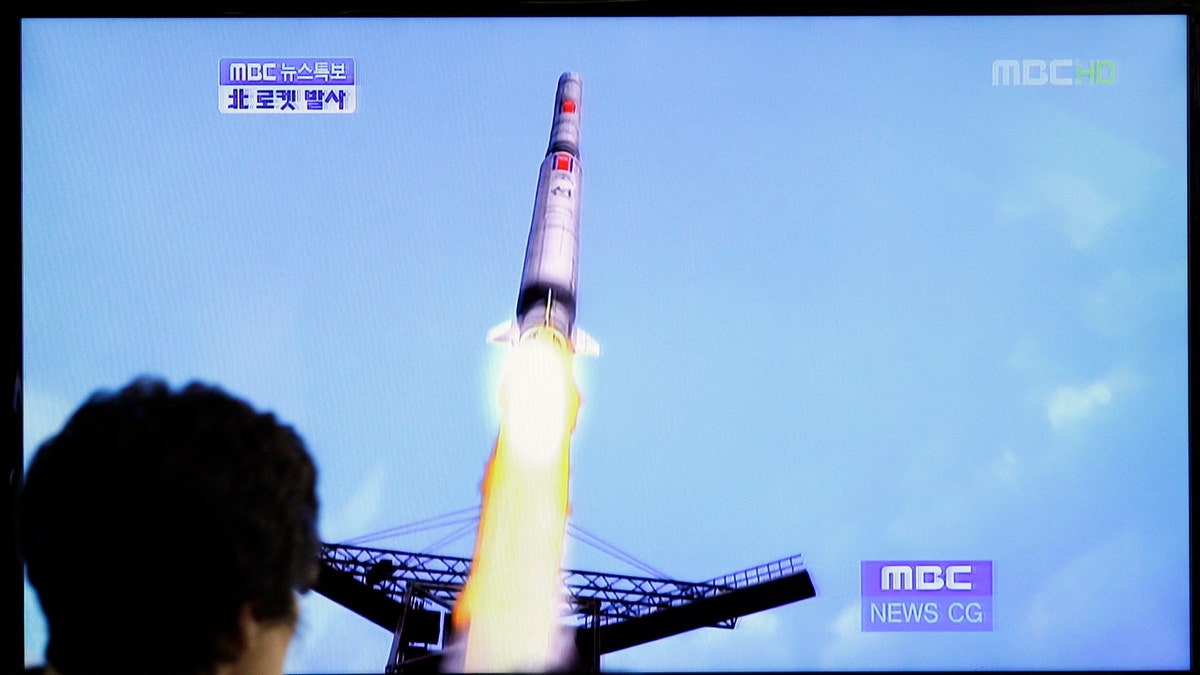
April 13, 2012: A South Korean woman watches a TV news report showing a computer generated image of North Korea's long-range rocket at Seoul train station in Seoul, South Korea. (AP)
Now that North Korea's rocket launch has ended in failure, its next move could be even more provocative: a nuclear test.
That's what followed previous launches in 2006 and 2009, and experts suspect the government is under even more pressure to do so now after its latest rocket burst apart just moments after liftoff Friday.
"This failure makes it even more likely that the North will now attempt a nuclear test in the not-too-distant future," said Ralph Cossa, president of the Pacific Forum CSIS, a Hawaii-based think tank. "The rocket launch was supposed to demonstrate the regime's power and technical prowess. A nuclear test may now be seen as even more necessary, not just to further perfect their weapons capability, but also to save face."
The possibility that North Korea is preparing for what would be its third nuclear test is supported by a South Korean intelligence report. It concludes that excavation for a possible underground blast at the Punggye-ri nuclear testing area is in its final stages, citing recent satellite photos showing piles of dirt near a newly dug tunnel entrance.
The activity South Korea says is going on has likely been long in the planning and suggest a test could be conducted later this spring, said Lewis Franklin of the Center for International Security and Cooperation at Stanford University. A major question is whether they test a plutonium device, as they have in the past, or use uranium for the first time, which would signal that their secretive uranium processing facilities are in operation.
North Korea's missile and nuclear programs are tightly interwoven. It wants to develop a missile that can reach the United States and a nuclear warhead small enough to mount on a missile -- something another nuclear test could help it do. The combination would make the U.S. think twice before getting involved should any fighting break out between the two Koreas, which technically remain at war.
"We should beware," Franklin said, "but an underground test doesn't mean they have a nuclear weapon."
The launch Friday demonstrated North Korea has a long way to go before it can reliably mount an intercontinental ballistic missile attack -- though it also shows it is willing to risk the international sanctions that such tests bring. U.S. officials claim sanctions on North Korea have kept it from obtaining the guidance technology it needs to control multistage rockets.
"They still haven't gotten this worked out. This is not a good sign for them," said Greg Thielmann, a senior fellow at the Arms Control Association and a former intelligence officer with the U.S. State Department.
North Korea probably didn't learn much from the launch either.
"Because the launch ended so early, North Korea would have gotten relatively little information from the launch that would be useful for advancing its development program," physicist David Wright of the Union of Concerned Scientists posted on the disarmament advocacy group's website.
He said the first of the rocket's three stages may have splashed down well east of the intended path, suggesting a guidance problem early on that caused the rocket to begin to veer off course. North Korea's mission control may have then shut down the engines to abort the flight.
"Whether this was the scenario, or whether there was a catastrophic failure of some kind, may become clear as more information emerges," he said. U.S., South Korean and Japanese naval ships are now scouring the seas to recover debris in a search for clues.
Diplomatically, the launch has already cost North Korea a much-needed food-aid deal with the United States, and U.S. State Department spokeswoman Victoria Nuland said this week that a nuclear test "would be equally bad if not worse" than a rocket launch.
The U.N. Security Council called an emergency meeting Friday to discuss its response to the launch. The U.N. will be hard-pressed to say something, but any criticism could actually increase the chances of a North Korean nuclear test.
North Korea has described past sanctions or condemnation of its launches as evidence that the United States and its allies want to deny what it calls its sovereign right to defend itself and develop its technology. That, it turn, is used to justify ignoring demands that it not conduct nuclear tests.
"They could use that to push forward with a nuclear test, as they have done in the past," Thielmann said.
Cossa said the U.S. and the U.N. would need to push hard to deter North Korea from another test, but added that the prospects of serious penalties seem remote because China will "continue to water down any attempt by the U.N. Security Council to take strong action."
"If the international community is serious about trying to deter another nuclear test, then the UNSC needs to discuss penalties in advance and make it clear to Pyongyang what the consequences will be, in the form of stricter, and strictly enforced, economic and financial sanctions," he said. "Beijing will also have to send a credible message to Pyongyang that it is serious this time about enforcing sanctions."








































